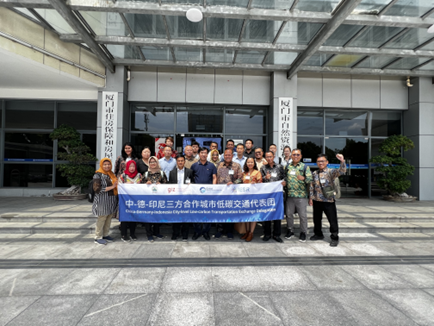The Urban-Act project held a knowledge sharing workshop titled “Urban Spatial Planning in the Context of Climate Change: Indicator System and Implementation Assessment” in the project’s pilot city of Xi’an on 13 October 2023. With the support of Tongji University and Xi’an Urban Planning and Design Research Institute, the workshop allowed for exchanges on current developments and noteworthy practices by twenty representatives and implementation partners from Xi’an, Xiamen, Beijing, and Shanghai.

The Urban-Act project’s China component held a knowledge sharing workshop titled “Urban Spatial Planning in the Context of Climate Change: Indicator System and Implementation Assessment” in the project’s pilot city of Xi’an on 13 October 2023. With the support of Tongji University and Xi’an Urban Planning and Design Research Institute, the workshop allowed for exchanges on current developments and noteworthy practices by twenty representatives and implementation partners from Xi’an, Xiamen, Beijing, and Shanghai.
Featuring experts from National Land and Space Planning Research Center of the Ministry of Natural Resources (MNR) and practitioners from Xi’an, Xiamen, and Shanghai, the workshop focused on the practical and technical needs of China’s urban spatial planning, implementation, and supervision in the context of climate change. It provided an opportunity for the participants to better understand the status quo of the indicator system and implementation assessment methods, as well as to discuss technical roadmaps, models, and real-life cases in China and abroad. Moreover, the workshop served as a platform to share technical outputs of the Urban Act project in 2023 and enhance the interaction among pilot cities and implementing partners. The workshop’s outcomes are also expected to promote regional cooperation and exchange among other country components, working groups, and partners of the Urban-Act project.
The workshop started with a review of the implementation assessment network of spatial planning in China by Dr CAI Yumei from China Land Surveying and Planning Institute, and an introduction of the EU’s and China’s strategies, standards, and indicators for addressing climate change in spatial planning by Ms ZHANG Dongyu from National Center for Climate Change Strategy and International Cooperation.

The presentations were followed by two thematic sessions on low-carbon and climate resilient urban spatial planning. In the discussion on the indicator system for low-carbon urban spatial planning, participants explored technical ideas for developing the “objectives-strategies-indicators” framework based on spatial climate interaction, and approaches concerning incorporating carbon emission requirements into policies, technical standards, and implementation evaluation networks for urban spatial planning. Shanghai Urban Planning and Design Research Institute and Xiamen Land Space and Transportation Research Center provided their own experiences on low-carbon urban spatial planning at the city-level and in the transport sector.
In the discussion on the indicator system for climate-resilient urban planning, Tongji University and Xi’an Urban Planning and Design Research Institute shared their research on indicators for urban transportation and the city of Xi’an. The presenters concluded that entry points for the issue of climate resilience in urban spatial planning in Chinese cities need to be clarified in line with China’s overarching national policy design on climate change and the policy agenda of the MNR.
The workshop, physically gathering the participants in Xi’an, created an opportunity to align the understanding of the concepts and policy frameworks in the cross-cutting fields of urban spatial planning and climate change, and clarified the environment, opportunities, and challenges of Urban-Act project implementation.



